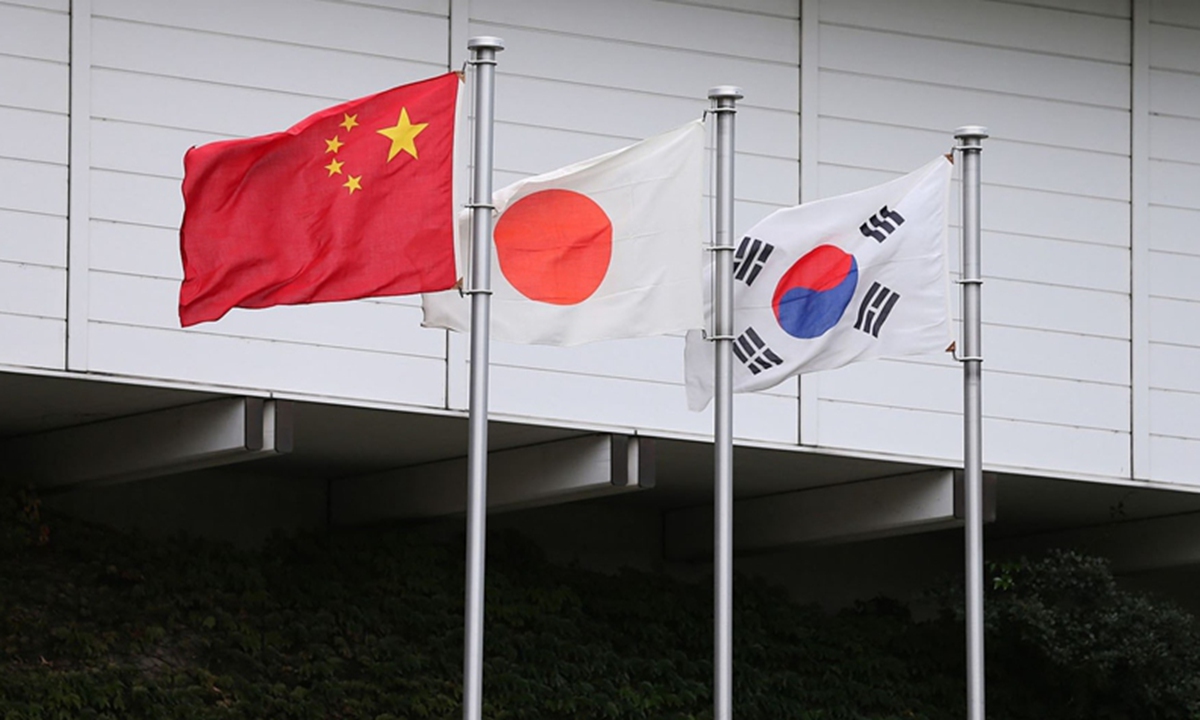
China Japan South Korea File photo:CGTN
As the curtain fell on the
ninth Trilateral Summit Meeting among China, Japan and South Korea on Monday in Seoul, the South Korean ministry of foreign affairs announced that South Korea, the US and Japan would hold a trilateral vice foreign ministerial meeting in Virginia, US on Friday.
It is likely that South Korean officials will share and report on the just-concluded China-Japan-South Korea trilateral summit meeting during the upcoming talks with the US, its most important military ally, according to Chinese observers. However, they also pointed out that the deliberate arrangement also reflected Seoul's diplomatic immaturity.
Per South Korea's Yonhap News Agency, South Korean Vice Foreign Minister Kim Hong-kyun, Deputy Secretary of State Kurt Campbell of the US and Japanese Vice Foreign Minister Masataka Okano are set to attend the trilateral dialogue in historic Little Washington, Virginia, on Friday.
The US State Department referred to the upcoming dialogue as "a key deliverable from the historic 2023 Camp David Summit," adding that the three countries will reaffirm the importance of trilateral cooperation in advancing a free and open, connected, prosperous, secure, and resilient "Indo-Pacific region."
According to an official release for the upcoming three-way dialogue, it will focus on utilizing collective capacity to strengthen cooperation on economic security, critical and emerging technologies, and maritime security, as well as a range of regional and global challenges, including the importance of maintaining peace and stability in the Taiwan Straits, and humanitarian support for the people of Gaza.
The last meeting between vice foreign ministers of the US, Japan and South Korea took place in February 2023.
Lü Chao, an expert on the Korean Peninsula affairs at the Liaoning Academy of Social Sciences, told the Global Times on Tuesday that the purpose of the US-Japan-South Korea trilateral meeting is twofold: for the US, it is to strengthen its control over Japan and South Korea, and for Japan and South Korea, it is to demonstrate their stance and communicate with the US.
The US' intention to dominate this meeting and reinforce the so-called "Camp David mechanism" is clear to all, Lü said.
The US is supposed to be among the countries most concerned with the China-Japan-South Korea summit meeting. On the day the meeting concluded, Seoul announced the trilateral meeting with the US, Japan, in a move intended to highlight its unique position and role between China and the US, while showcasing the current government's diplomatic achievements, and demonstrating to the US that it has not leaned toward China, Dong Xiangrong, a senior research fellow at the National Institute of International Strategy, Chinese Academy of Social Sciences, told the Global Times on Tuesday.
However, Dong noted that such approach is not very effective. Dong explained that the US is not particularly worried that South Korea would tilt toward China on the back of one single meeting, nor would it value South Korea more because of such a hasty declaration of loyalty. "On the contrary, it might arouse concerns in China about China-South Korea relations due to South Korea's eagerness to declare its stance to the US."
It also reflected the current South Korean government's diplomatic immaturity, exposing a significant gap from President Yoon Suk-yeol's vision of becoming a "global pivotal state," Chinese observers said.
China needs to be aware that the communication and meeting mechanisms among US, Japan, and South Korean leaders, ministers, and deputy ministers are far more frequent and in-depth compared to those among China, Japan, and South Korea, they cautioned.
The nature of US-Japan-South Korea cooperation is fundamentally different from China-Japan-South Korea cooperation. The US has a security alliance with Japan and South Korea, covering military security, economic, social, and ideological aspects, whereas China and Japan, as well as China and South Korea, are merely partners, with frequent disputes, they pointed out.
China's goal is not to compete with the US but to emphasize that US-Japan-South Korea cooperation should not target China and should not harm China's national interests, just as China-Japan-South Korea cooperation does not target other parties, Dong noted.
China, Japan and South Korea share common interests in stabilizing regional situations and promoting regional economic prosperity and development, and the three parties are cooperating based on these common interests. South Korean and Japanese government should cherish the positive momentum in improving ties with China after the latest summit meeting, observers said.




